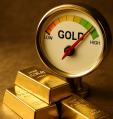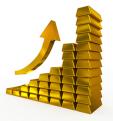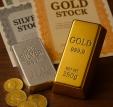Gold Price Should Prepare For Further Fed Hikes
98.4 percent…that is the market odds of the September Fed hike. But what will happen later? In this edition of the GNM, we dig into the recent FOMC minutes to answer this question. Read our article and find out!
September Is Certain
At the end of August, the Fed released minutes from the recent FOMC meeting. They signal broad support for another interest-rate hike in September. The following paragraph is very telling:
Many participants suggested that if incoming data continued to support their current economic outlook, it would likely soon be appropriate to take another step in removing policy accommodation. Participants generally expected that further gradual increases in the target range for the federal funds rate would be consistent with a sustained expansion of economic activity, strong labor market conditions, and inflation near the Committee's symmetric 2 percent objective over the medium term.
Indeed, the market odds of the September hike are above 98 percent. So it is almost a certain move. Given that the raise in the federal funds rate is so widely expected, it should not significantly affect the gold market. Now the question is what the Fed will do after September.
Will the Fed Pause in December?
Some analysts believe that the U.S. central bank will pause in December. They present two arguments in support of their opinion. First, the minutes show concerns about international trade disputes. The FOMC members see them as an important downside risk to the economy. Indeed, most participants:
“…expressed the view that an escalation in international trade disputes was a potentially consequential downside risk for real activity. Some participants suggested that, in the event of a major escalation in trade disputes, the complex nature of trade issues, including the entire range of their effects on output and inflation, presented a challenge in determining the appropriate monetary policy response.”
Second, the Fed officials worry also about the flattening of the yield curve, as its inversion historically often preceded recessions:
Participants also discussed the possible implications of a flattening in the term structure of market interest rates. Several participants cited statistical evidence for the United States that inversions of the yield curve have often preceded recessions. They suggested that policymakers should pay close attention to the slope of the yield curve in assessing the economic and policy outlook.
We Don’t Think So
We do not buy these arguments. It’s true that some of the FOMC participants are really worried about the yield curve, but not all of them. Actually, the Fed officials are strongly divided on that issue. Other members question the usefulness of the yield curve as recession indicator in the current macroeconomic environment:
Other participants emphasized that inferring economic causality from statistical correlations was not appropriate. A number of global factors were seen as contributing to downward pressure on term premiums, including central bank asset purchase programs and the strong worldwide demand for safe assets. In such an environment, an inversion of the yield curve might not have the significance that the historical record would suggest; the signal to be taken from the yield curve needed to be considered in the context of other economic and financial indicators.
In the two last editions of the Market Overview, we explained why precious metals investors should be careful to draw conclusions based on the changes in the shape of the yield curve in the world of heavy central bank interventions in the markets.
And when it comes to the international trade disputes, they indeed are a downside risk. But potential dangers are not the same as actual hindrances. The truth is that concerns about trade tensions have not affected the outlook for U.S. monetary policy so far:
Concerns regarding international trade policy weighed on market sentiment at times over the intermeeting period, prompting notable declines in some foreign equity markets but leaving only a modest imprint on domestic asset prices on net.
Implications for Gold
The recent FOMC minutes show green light for a September rate hike. Although some analysts believe that the Fed may pause in December, we keep our forecast of four interest rate hikes in 2018 unchanged. The markets odds are signaling a 98 percent probability of a rate increase in September and almost a 66 percent chance of another upward move in December. Don’t fight the market.
And with the Fed. It will continue its policy of gradual tightening. Unless trade disputes transform into full-blown trade wars, we should see two more hikes this year. As it is barely something new for the market, it should not sink the gold prices. But it will also not support the gold prices. Actually, there is room for further gold price declines, as the market expectation for the December hike may still strengthen from the current 66 percent. Stay tuned!
Arkadiusz Sieron
https://www.sunshineprofits.com/
* * * * *
All essays, research and information found above represent analyses and opinions of Przemyslaw Radomski, CFA and Sunshine Profits' associates only. As such, it may prove wrong and be a subject to change without notice. Opinions and analyses were based on data available to authors of respective essays at the time of writing. Although the information provided above is based on careful research and sources that are believed to be accurate, Przemyslaw Radomski, CFA and his associates do not guarantee the accuracy or thoroughness of the data or information reported. The opinions published above are neither an offer nor a recommendation to purchase or sell any securities. Mr. Radomski is not a Registered Securities Advisor. By reading Przemyslaw Radomski's, CFA reports you fully agree that he will not be held responsible or liable for any decisions you make regarding any information provided in these reports. Investing, trading and speculation in any financial markets may involve high risk of loss. Przemyslaw Radomski, CFA, Sunshine Profits' employees and affiliates as well as members of their families may have a short or long position in any securities, including those mentioned in any of the reports or essays, and may make additional purchases and/or sales of those securities without notice.

















